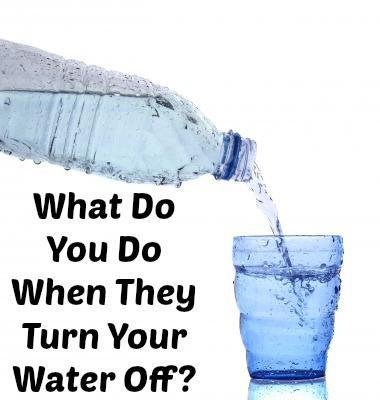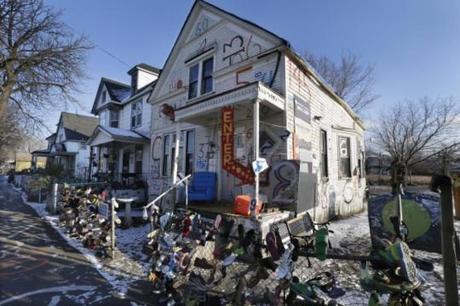 The US Declaration of Independence lists among the “inalienable rights” of all people the rights to “life, liberty and the pursuit of happiness.” We’ve all heard it a million times but what does it really mean in our modern society? Does the right to life simply mean the right to BE alive? Or does it mean that everyone, regardless of their level of income, education, ability or even ambition has a basic human right to those items and services needed to stay alive?
The US Declaration of Independence lists among the “inalienable rights” of all people the rights to “life, liberty and the pursuit of happiness.” We’ve all heard it a million times but what does it really mean in our modern society? Does the right to life simply mean the right to BE alive? Or does it mean that everyone, regardless of their level of income, education, ability or even ambition has a basic human right to those items and services needed to stay alive?
What happens when a person can’t keep a roof over their head? When they can’t afford food? When they are sick but have no way to pay a doctor? What about that most basic need – clean water?
When you think of people lacking access to clean water you may envision a family living in some rural part of India or Africa or in a part of the world where there was recent extreme violence or a natural disaster but, earlier this month, a group of people from Detroit reached out to the United Nations Human Rights Office of the High Commissioner with a plea for help. The city had shut off water services for thousands due to non payment.
That’s right. American’s are begging the United Nations for humanitarian aid. Next time you hear someone say the economic crisis is over remember this story.
The UN’s response was basically a statement that said shut off for non payment was only allowed if a resident was able but unwilling to pay. Beyond making a statement there really isn’t much they can do at this time.
The city of Detroit came back with all of the predictable responses. Tens of thousands of delinquency notices were sent out in May. Most were either paid or payment arrangements were made but thousands remained and when the due date passed the city began turning their taps off. “We are doing our best to work with people.” For a city that is in complete economic shambles, administrators felt there was no choice but to terminate services for those residents.
So now what do they do?
I realize there are many who just feel that folks in these stories are just sitting around mooching off of society. They are criminals and addicts and slackers of all sorts. It’s true that many of them are all of that and more, but certainly not all of them. And even those who are… well… let’s look at the world they live in.
I only live about an hour from Detroit but it is a universe away. I know that the city has gotten national attention but I’m not sure how much people further away really know about what’s happening there. Honestly, I probably can’t grasp it fully myself since we don’t go into the city.
The city is bankrupt. There are whole neighborhoods of abandoned houses which are, not surprisingly, some of the most crime-ridden zip codes in the entire nation. Desperate people are burning down vacant houses in an attempt to avoid having “crack houses” in their neighborhood. Schools are often wrought with violence and the drop out rates are astounding.
“Just get a job!” is a joke. The unemployment rate hovers around 15% and that’s not taking into account the thousands who have fallen off the roles or never made it onto them in the first place. Nor does it count the thousands who can only find part time, minimum wage work.
Assuming a person is able to get a decent education in such an environment and that they have the astonishing focus and strength of will required to finish school, then what? Where do you work in a city where there are no jobs? How do you get to work if you have no car and the city bus may or may not be running any given week because the infrastructure is crumbling?
Can you honestly say that you wouldn’t beg for help in such a situation? Can you swear that you would never consider crime, if you were that desperate to feed your family? And how much does your level of desperation increase when you wake up one morning to find you can no longer flush the toilet, take a shower, or give a glass of water to your child?
This is not some distant, impoverished nation. This is happening just a short drive from where I live in Happy Hills Suburban/Rural America. The residents of the city are trying – desperately, fiercely fighting – to save their city but the challenges are immense.

I get it, from the city’s point of view. Really, I do. There is already an astonishing deficit. The resources to go on just aren’t there. The city, as a whole, is in the same boat as the desperate residents. They need people to pay their debts or at least to make some attempt at trying to pay. They literally can’t afford to be lenient.
But it’s not just Detroit.
In younger, poorer, darker days I was in this same boat. I had a job but I was scrambling. Granted my problems were, at least in part, due to my own mistakes but once you’re in that hole… it’s a long hard climb to get out, even if someone extends a helping hand. When I turned on the faucet and got no response I simply wept. I literally wanted to die if life was going to be so hard.
Thanks to God, things have improved in my life, but every month when I fork over $70+ to the village for access to running water I think of those days.
People have been slamming the CEO of Nestle Corporation for saying that water is a commodity that should be sold like any other but, really, aren’t we already doing that? Sure, there are some people who have wells but, for hundreds of millions of Americans water already IS a commodity they are paying for.
And, looking at this from both sides, there are good reasons.
Water treatment plants and the construction and maintenance of the pipelines that bring it into our homes are extremely costly.
Also, water is a finite resource. There is only so much to go around and people tend to be a lot more careful about their use when it hits them in the pocketbook.
And it’s easy to say, “those who can pay should,” but, then again, how do you make that determination?
I don’t know the answer, but I know that it makes my heart hurt to think that, not so very far away at all, at this very moment, there is a mom who is faced with putting dinner on the table at the end of a long day of back breaking, menial work for which she was paid less than my family spent on our last trip to Chuck E. Cheese’s. She hasn’t been able to wash up properly. She can’t clean the dishes. She can’t even fill the pot to boil some pasta unless she spends a precious dollar on a gallon of water from the grocery store.
All of this and I’m not even getting into the debates that are popping up all over the nation over people who are trying to “go off the grid” and facing various legal opposition which forces them to stay “plugged in.” Again – there are valid reasons ranging from sanitation, to fair use, to economic issues for those laws but… now we’ve come full circle to “life, liberty and the pursuit of happiness.”
What do you think? Should a city have the right to stop water service to those who can not/do not pay?
Additional Reading:
UN Help Sought to Restore Detroit Water Service
Nestle’s Peter Brabeck: Our Attitude Toward Water Needs To Change
Are you, too, seeking to save the earth, promote world peace and raise productive citizens without expending too much effort?
Why not follow Lazy Hippie Mama by email, Facebook, Google+, Twitter or Instagram to get all the updates?
If we work on our goals together, they may be a little easier to achieve!

